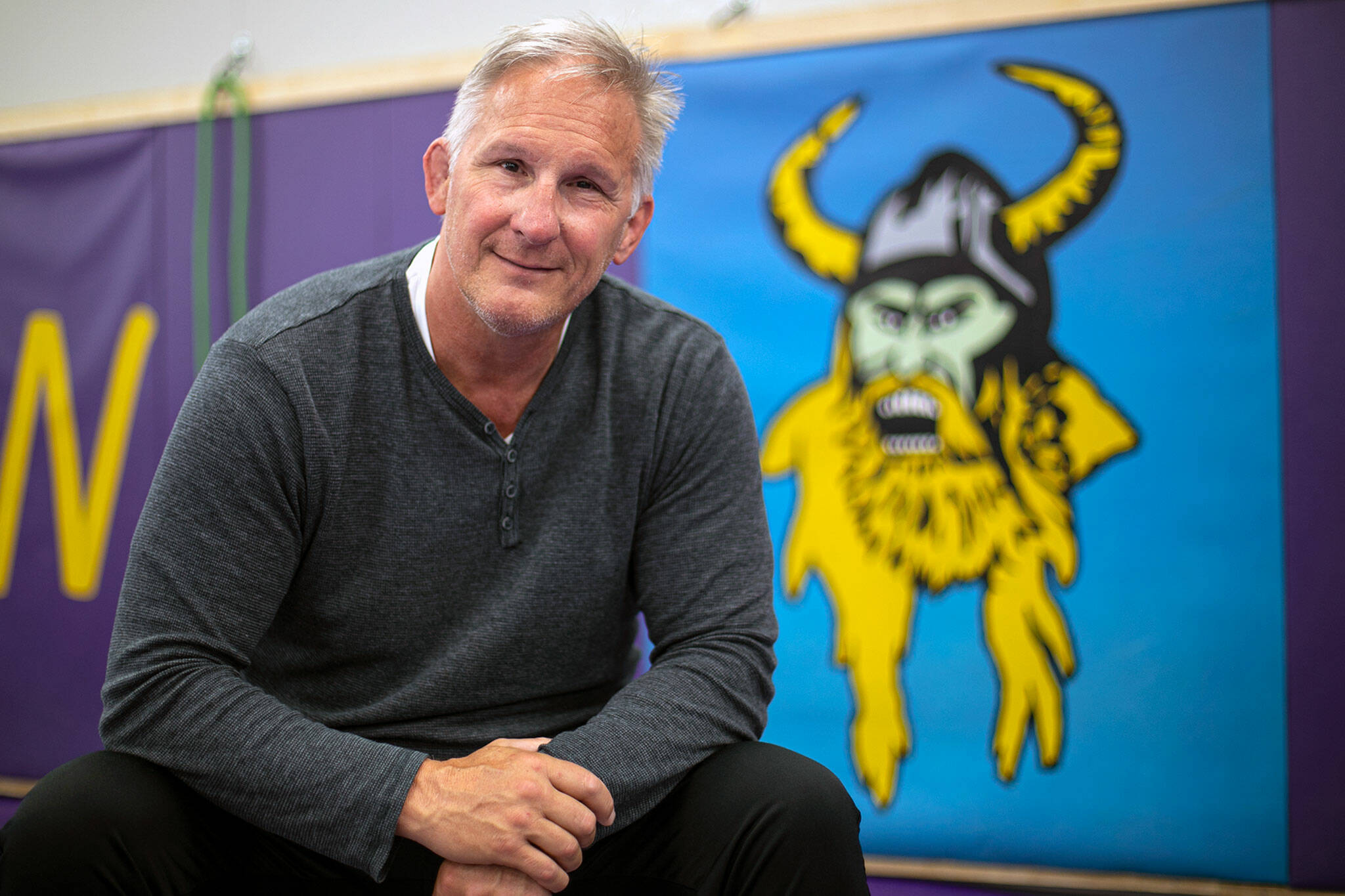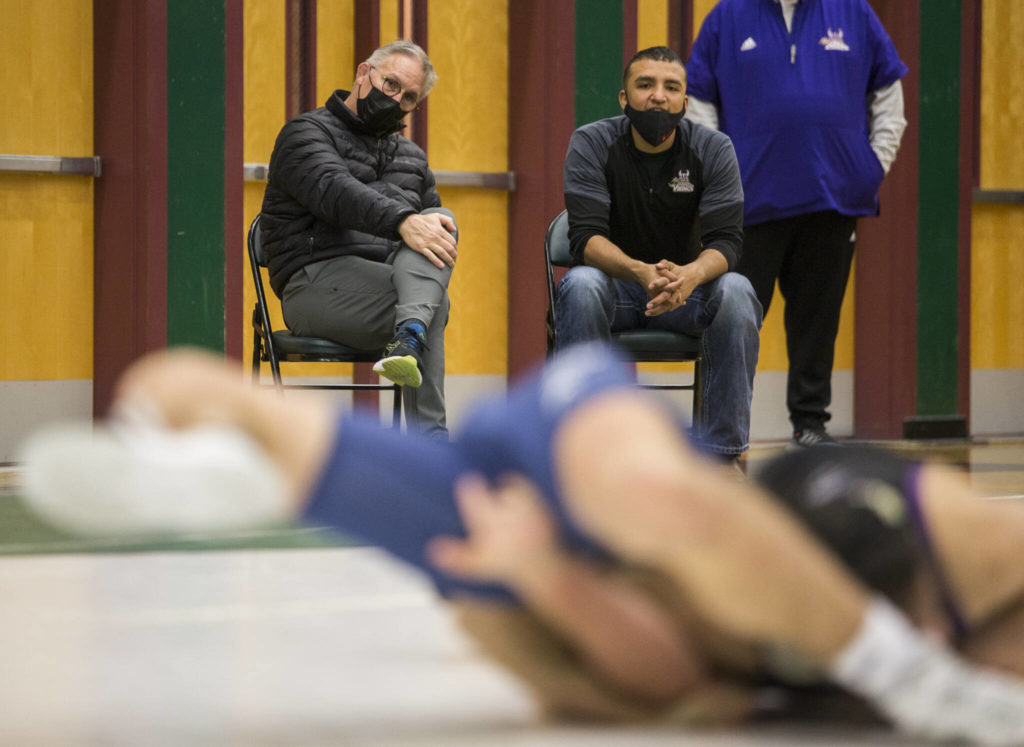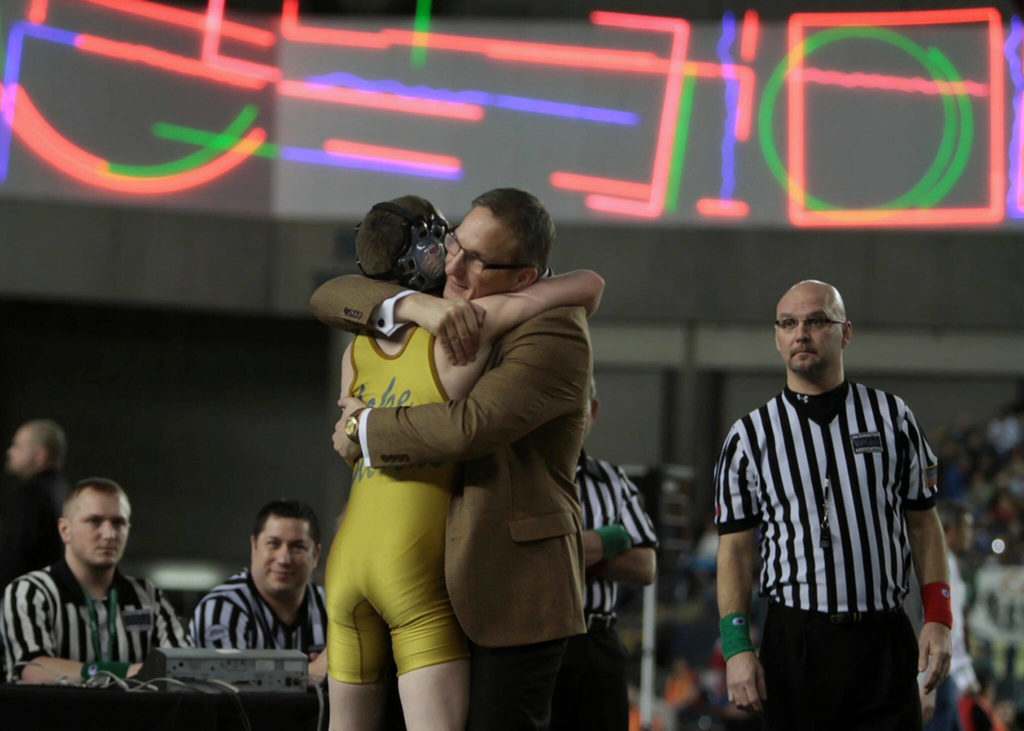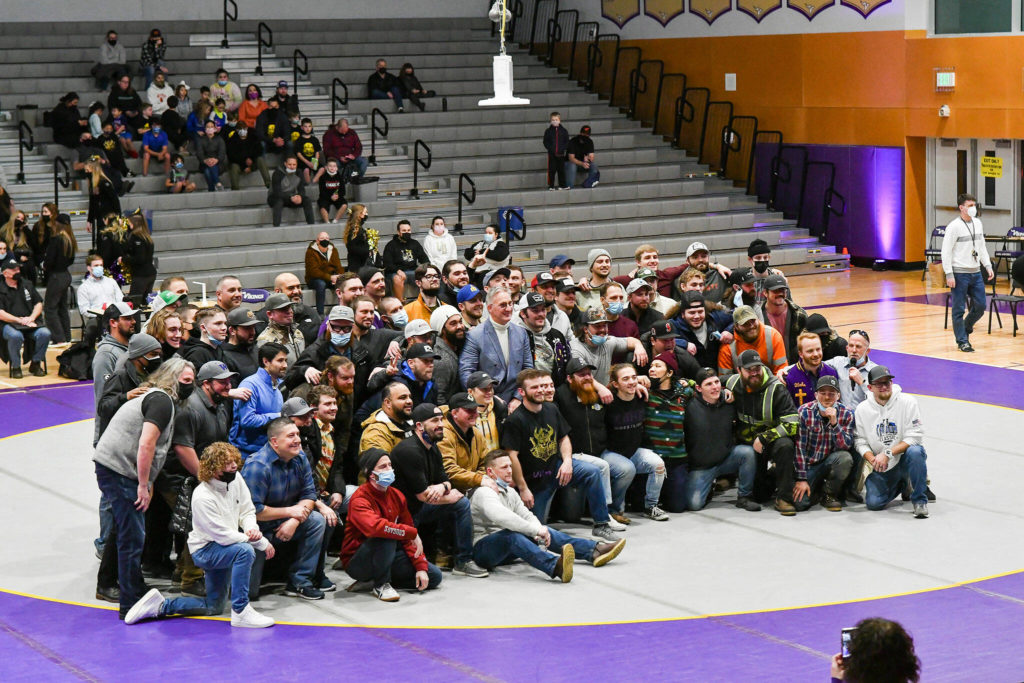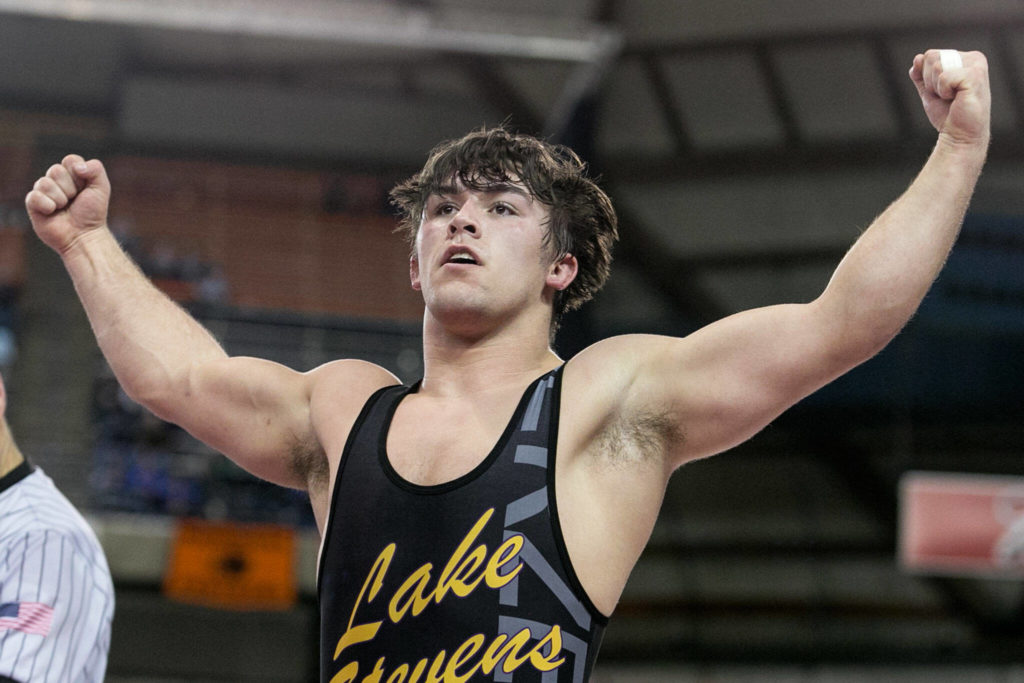Kai VanLeuven remembers the numerous early-morning training sessions with Brent Barnes.
By his own admission, VanLeuven had underperformed in his first three years as a wrestler at Lake Stevens High School. At one point as a senior, he considered quitting.
But his head coach believed in him.
About four mornings per week for a large chunk of that 2005-06 season, Barnes arrived early in the dark of winter to work with VanLeuven before school.
“He didn’t have to do that,” VanLeuven said. “He’d already coached (a lot of) state champs. He could’ve said, ‘It’s the middle of winter in Washington and I want to sleep.’
“But instead he said, ‘I want to work with this guy. I’m gonna put time into this guy.’”
VanLeuven went on to win a state title that year, beating a wrestler in the finals that he’d lost to earlier in the season.
VanLeuven is one of 24 wrestlers who won at least one individual state title during Barnes’ legendary head-coaching career at Lake Stevens, which came to a close in February with his decision to retire.
“I was probably one of the least talented wrestlers to win a state title at Lake Stevens,” VanLeuven said. “… Somebody who wasn’t as optimistic as (Barnes) would’ve said, ‘This guy’s gonna blow it again at the state tournament.’ But he just believed that I could do it.
“People who are outside of the program, they see just the winning,” he added. “(But) it’s not a factory that stamps out product.
“It’s him individually working with people and him individually caring about kids.”
‘One of the best ever’
If there was a Mount Rushmore of Washington state high school wrestling coaches, Barnes would surely be on it.
His list of accomplishments, quite simply, is staggering.
Barnes built Lake Stevens wrestling into an absolute juggernaut, coaching the Vikings to a whopping 11 state team championships in his 35 seasons at the helm. That’s believed to be the most state titles by any prep wrestling coach in state history.
Lake Stevens was the state’s gold standard for much of that time, rattling off a remarkable run of 10 state championships in 17 seasons from 2000 through 2016. The Vikings also racked up a total of 18 top-three state team trophies under Barnes.
“If you aspired to win a state title, for a long time all roads went through Lake Stevens,” said Tahoma coach Chris Feist, whose program has been one of the Vikings’ biggest state challengers.
Under Barnes, Lake Stevens totaled 41 individual state titles (39 boys and two girls), 87 individual top-three state finishes (83 boys and four girls) and 188 individual top-eight state placings (181 boys and seven girls).
At one point, Barnes’ program had a jaw-dropping streak of 22 consecutive seasons with at least one state champion.
And of the 17 boys wrestlers in state history to become four-time state champions, two did so under Barnes at Lake Stevens. His son, Burke Barnes, pulled off the rare four-peat in 2002, and Michael Soler completed his four-peat in 2016.
“When you look at just the consistency and the statistics that (his) teams put up, he’s one of the best ever,” Feist said of Barnes’ standing among the state’s greatest wrestling coaches.
But as VanLeuven and others who’ve spent time in the program are quick to point out, Barnes’ legacy spans far beyond all the trophies and accolades.
“The amount of lives that he’s affected in such a positive way, it’s a very long list,” former Lake Stevens wrestler Jon Wilbourne said.
That was exemplified by the approximately 75 former wrestlers who attended Barnes’ final home match in late January, which served as a retirement celebration. Some came from out of state, flying in from California, Colorado and New Jersey.
The ceremony for Barnes that night included a video tribute from Hollywood star Chris Pratt, who wrestled for the Vikings in the 1990s. Pratt, who considers Barnes a lifelong friend and mentor, produced a 2012 MTV documentary about the Lake Stevens program that won an award at the prestigious Tribeca Film Festival in New York.
“Brent’s legacy is the people,” longtime Vikings assistant coach Andy Knutson said.
“How loved he is by his wrestlers and coaches — that’s his legacy.”
Growing up on the mat
Some of Barnes’ earliest memories are from the corner of a high school wrestling mat.
Barnes’ father, Ray, was the head wrestling coach at Puyallup High School for 15 years and was later inducted into the state wrestling coaches association’s Hall of Fame. Barnes tagged along to his father’s practices and matches as a youngster, often sitting in his lap as he coached.
“My experience early on really put a love of the sport in me,” Barnes said.
Growing up, Barnes wrestled with family members in the living room. He remembers sitting at the dinner table and hearing talk of a mysterious place called “state,” where powerhouse teams like Moses Lake and Sedro-Woolley excelled.
At age 7, Barnes received his first wrestling singlet as a Christmas present from Santa. He wore it nonstop, even to bed.
“The elastic around the legs was so tight (that) I’m probably lucky I didn’t have a blood clot, because I had a permanent crease in my thighs from the thing,” Barnes said with a laugh.
“I was definitely a dreamer as a kid.”
Barnes became a standout wrestler at Rogers High School in Puyallup, placing second in state as a junior and then winning a state title as a senior in 1980.
He went on to junior college power North Idaho College, where he wrestled under longtime coach John Owen. He won a national title there at 158 pounds in 1982, helping lead that year’s team to a national championship.
“If I didn’t know I was gonna be a coach when I was a kid or going through high school, it kind of cemented it in junior college,” Barnes said. “(John) was a great example for me and an absolute phenomenal role model that really solidified the love of coaching and the sport of wrestling.”
Barnes then transferred to national powerhouse Oklahoma State, whose 34 wrestling team national championships are the most of any program in Division I college athletics.
Barnes started at Oklahoma State for three-quarters of the 1983 season. He got to train with future Olympic gold medalist Kenny Monday and eventual two-time national champion Mike Sheets.
However, a shoulder injury stalled Barnes’ career with the Cowboys. He ended up returning to the Pacific Northwest and finishing his degree at Washington State University.
Looking back, he said he regrets not using a redshirt year at Oklahoma State and pursuing All-American status.
“That’s the one regret I have — not being an NCAA All-American,” Barnes said. “I think I was close enough. But I also used that to drive me to be a really good coach. I think some of your best coaches are guys that probably wish they could’ve been a little bit better athlete and who had a little bit more success.
“The sport of wrestling is hard,” he added. “It’s really hard. And I think having some ups and downs — and having taken some losses and not achieved my goals in some ways — made me a better coach.”
A blessing in disguise
It was a twist of fate that brought Barnes to Lake Stevens.
While student teaching, he spent one season as an assistant coach at North Idaho College. He spent another as an assistant at Bethel High School in Spanaway.
Barnes then landed the head coaching job at Wilson High School in Tacoma, not far from where he grew up. He bought a house in the area with his wife. He held a team meeting. He was ready to start his head-coaching career.
But then, a district employee filed a grievance over the position not being opened within the district first.
“They called me and said, ‘We’ve gotta take the job away,’” Barnes said.
Barnes quickly pivoted. Having also applied for the head coaching position at Lake Stevens, he called to see if that job was still available. It was, so he traveled to Lake Stevens for an interview the next day.
Following the interview, he was offered the job.
In hindsight, Barnes said the whole ordeal was a blessing in disguise. He said coaching, teaching and raising his family in a one-high-school town like Lake Stevens provided benefits he wouldn’t have had at Wilson.
“I was really fortunate to end up in Lake Stevens,” he said. “I didn’t realize what a great place it was gonna be. … I really lucked out.”
After taking over the Vikings’ program in the spring of 1987, Barnes met with the previous head coach. Barnes remembers asking him what it’d take to win a state title at Lake Stevens. At that point, the Vikings had never won a state title in any sport.
“He looked at me real serious and he goes, ‘I don’t think you can,’” Barnes recalled.
“And being young and a little bit stubborn, I was like, ‘I think I’m gonna prove this guy wrong.’”
Barnes inherited a very young, yet talented team. He started nearly all freshmen and sophomores in his first year at the helm, led by eventual state champion and future University of Washington linebacker Richie Chambers.
That group began to blossom in Barnes’ second season, when the Vikings upset perennial state powers Marysville Pilchuck and Sedro-Woolley in dual meets on back-to-back nights.
And the following year in 1990, Lake Stevens broke through and captured the Class 3A state title. It was the first state championship in school history.
“I was really fortunate to have that class,” Barnes said. “And it enabled me to be able to do things my way and to instill my philosophy in the program, without older guys that did it the old way. … Looking back now, I realize that was probably the best thing. And I had good athletes.
“So the stars just kind of aligned.”
‘We just kind of took off’
Barnes and the Vikings had reached the mountaintop.
But after a bit of a lull in the years that followed, he began wondering whether they’d ever make it back.
They came close in 1996, when Lake Stevens earned a second-place state trophy. But the following year, the Vikings finished a disappointing 13th at state after placing just two of their 12 state qualifiers.
During the finals of that 1997 Mat Classic, Barnes remembers walking to the top of the Tacoma Dome stands and having some moments of self-reflection.
“I knew that we had to make some changes and we just had to redouble our work ethic,” Barnes said. “And we did. We just started putting a lot more time in.
“It wasn’t enough anymore just to take kids to camp in the summer and come home and not see them for the next three months.”
Barnes focused on building up Lake Stevens’ club program, which gave his wrestlers an opportunity to train throughout the offseason.
“I just said, ‘Man, I’ve gotta build something here. I’ve gotta get 20 Lake Stevens kids in high school hanging out in this (wrestling) room,’” he said. “And we really started to do that.
“It wasn’t anything special,” he added. “There were no secrets. … Just being in the room and doing the hard work.”
That dedication to year-round training coincided with a talented influx of hard-working wrestlers who embraced spending time on the mat.
Among them were four-time state champion Burke Barnes and two-time state champions Mike Bundy and Danny Kleven. They helped set the standard for the program, which in turn elevated other wrestlers in the room.
And they helped put Lake Stevens back on top.
The Vikings returned to state title contention with a third-place trophy in 1998. They were state runners-up in 1999.
And in 2000 and 2001, they kickstarted their dynasty with back-to-back state championships.
“We just had this great crop that came through, and that kind of carried us all the way — even beyond (their) graduation,” Barnes said. “We just kind of took off.”
That crop of wrestlers was followed by a steady stream of talent that maintained and continued to build a culture of excellence for Lake Stevens wrestling.
The next one and a half decades were filled with wrestlers who won multiple individual state titles: Four-timer Michael Soler; three-timers Kelly Kubec and Josh Heinzer; and two-timers Lester Brown, George King, Eric Soler, Cody Vigoren and Malachi Lawrence.
They were joined by numerous other individual state champions and state placers.
And as a team, the state championships kept piling up.
The Vikings won another state title in 2004. They strung together three straight in 2007, 2008 and 2009 — capped by a dominant 169-point performance in 2009 that ranks as the third-most points in 4A state meet history.
And they added state titles in 2011, 2013, 2014 and 2016 to cement their status as one of the state’s all-time great wrestling programs.
“Success breeds success,” Barnes said. “It just builds on itself. And your community starts to take pride in it. You have (youth) coaches that are excited about it and they’re saying, ‘Look, I coached that kid.’
“So there’s a lot of dominoes that fall. And that’s what happened with us. We had a lot of people that had their hand in it.”
‘We were chasing him’
Some coaches get stuck in their ways.
That certainly wasn’t the case with Barnes.
Even as his program was racking up state titles, he was constantly striving to stay on the cutting edge. He was always learning, adapting and evolving.
“One of his passions about the sport is to stay up to date with what’s going on, learn about what’s being used in other places, and then (figure out) how to incorporate that into Lake Stevens wrestling,” longtime Vikings assistant coach Dean Width said.
“His style has changed a lot over the years, and our kids’ style has changed a lot over the years. And I’m not sure how many other coaches do that.”
VanLeuven, who graduated in 2006, came back a decade later to help coach in the program. When he returned, he noticed Barnes was teaching a bunch of different techniques.
“I’d be like, ‘Man, that’s not what we learned when I was in high school,’” VanLeuven said. “He’s like, ‘Yeah, it’s always adapting and changing.’
“The sport has evolved like crazy,” VanLeuven added. “You have to be able to adapt to that. And he’s done that.”
Whether it was watching the top college wrestlers at the NCAA Tournament or gaining insight from other successful high school programs, Barnes was always looking for ways to improve.
And sometimes, the inspiration came from overseas.
Barnes assisted with the USA Wrestling women’s program, serving on the coaching staff for six world championships at the Cadet (ages 15-17) and Junior (ages 18-20) levels. Being in the presence of elite wrestlers and coaches from around the world continued to expand his vast wrestling expertise.
“If you don’t change on a regular basis, you lose, and you stop getting better,” Barnes said. “You have to change and try to improve all the time. (And) part of improving is learning.”
Barnes then took what he learned and ingrained it into his Lake Stevens program.
“Brent’s a master educator,” Feist said. “And that’s the biggest difference I see in really good programs. They don’t just have coaches. They have educators. They have teachers (that) can break down a skill — and not just for your best kids, but for all your kids.
“They’re a very technical team,” he added. “(They) have really good foundational technique and a system for teaching that technique.”
Barnes’ wrestlers weren’t the only ones learning from him. Earlier in his coaching career, Feist remembers buying technique videos that Barnes made.
“I was deep into trying to figure out what they were doing and how they were doing it — so we could implement similar systems, but also so we could stop it when we were competing against them,” Feist said.
It was an example, Feist said, of how Barnes’ constant quest to improve himself and his team helped raise the level of other programs around the state.
“You need people like Barnes out there setting the high bar,” Feist said. “Some of the 4A programs that are competing at a high level — we’re there because we were chasing him.”
‘The process’
As the Vikings were churning out state titles, a funny thing happened.
Barnes and his coaching staff began focusing less on winning and more on the process.
“His philosophy changed,” Knutson said. “Before we won (all the titles), we were trying to win it. Like, in 2000, we were trying to win. And by the end, we weren’t trying to win anymore.
“We were trying to improve. We were trying to perform to the best of our ability.”
For Barnes, that philosophy originally stems from a book called “The Inner Game of Tennis.” It was a childhood gift from his mother, who used to play tennis with him in the summer when he was a kid.
Barnes, an avid reader, revisited the book early in his coaching career. He said it’s the best book on sports psychology he’s read. And ultimately, it planted the seeds for his process-based coaching philosophy.
“Way before you heard (Seattle Seahawks coach) Pete Carroll talk about ‘the process’ in his book, we were talking about it,” Barnes said.
“We tried not to talk about winning and outcome a whole lot,” he added. “We had goals. We set state championship goals, but our daily work was about getting better.”
It’s a mentality Barnes wishes he had as a wrestler.
Despite all of his wrestling success, Barnes battled competition anxiety. He said he put an enormous amount of pressure on himself, because he felt his world revolved around winning and losing.
Prior to his state championship match as a senior, he remembers waiting in the tunnel of the arena and wishing he was at home watching TV.
“Once the whistle blew, I was fine,” he said. “But before that, I was a wreck, because all I was thinking about was winning and losing. I wasn’t focused on the process of the activity.”
However, Barnes said his experiences with competition anxiety made him a better coach and allowed him to help wrestlers who dealt with similar challenges.
One of those wrestlers was four-time state champion Michael Soler. He said Barnes helped him navigate the heavy pressure and expectations that followed him throughout his career.
“I felt a lot of pressure wrestling,” Soler said. “I was told since I was a little kid that I was gonna be a four-time state champ and have all this success. It was pretty draining and really took a lot out of me.
“Barnes did a great job of putting it all in perspective and helping me focus on the right things.”
‘Everything had a purpose’
Barnes had a written plan for every practice.
And over his 35-year career, he kept every single one of those plans stored in his office.
“He knew exactly what he wanted to do and he had it all lined out,” said Bundy, who went on to become a high school head coach in Spokane. “… He was always very meticulous.”
For Barnes, practice was the centerpiece of his process-based program.
“He used to say all the time, ‘Practice is the most important thing we do,’” Knutson said.
True to form, Barnes was always searching for ways to perfect his practices — to make them as efficient and productive as possible. By the time Michael Soler came through the program in the mid-2010s, he said it was a well-oiled machine.
“Everything had a purpose,” Soler said. “Every workout or every speech, there was a reason for it. It really felt like a dialed system that just led us to peak at the end of the season.”
Bundy still remembers some of the drills Barnes had them do. Early in his career, Bundy said he couldn’t stand them. But over time, he realized their value.
“They were (aimed) toward that muscle memory and that reaction that you need in wrestling,” Bundy said. “And I think by my junior year, I really started to appreciate what he was doing. … I could see success in all the wrestlers as a group (and) I really felt like it elevated my wrestling.”
As former wrestlers described, Barnes’ practices were notoriously difficult from a physical conditioning standpoint.
“It’s the hardest thing I’ve ever done in my life,” Soler said of going through Barnes’ program.
But for those who stuck with it, the benefits were significant.
“(You) had to push yourself past that limit of where you thought you could push yourself,” Bundy said. “And when you started seeing the success, you understood that, ‘Hey, I never ever want to limit myself. … If I think I can only go to this point, I can push way further.’”
And Barnes, meanwhile, kept pushing past norms.
Long before it was common for high school teams to travel out of state, Barnes took his Vikings to prestigious tournaments in places such as Virginia and Pennsylvania. On one of their East Coast trips, they watched the ball drop in Times Square on New Year’s Eve.
Barnes also applied an outside-the-box approach to summer camp.
After years of taking his team to the same college team camp, he felt a sense of stagnation had set in. He reevaluated what they wanted to get out of summer camp — particularly the team-building aspect — and determined they’d be better served creating their own.
So one summer, Barnes took his team to an area near the Gorge Amphitheatre in central Washington. They stayed in tents at a campground owned by a former wrestler’s father. They did a variety of team-building activities, including skits and dance contests.
And for wrestling? To stay cool in the hot climate, they trained nearby in a large potato storage shed.
The Potato Barn Camp, as it became known, grew into an annual tradition. And over time, it expanded to include other teams.
“He was not afraid to try anything,” Knutson said. “He would break barriers constantly.
“It just constantly evolved,” he added. “What’s better? What’s even better? … It just never stopped. We made (things) better and better and better.”
‘Surrounded by incredible people’
Barnes is quick to credit his coaching staff for the program’s success, especially his two longtime assistants Width and Knutson.
“I was really fortunate to be surrounded by incredible people in Andy and Dean,” Barnes said. “You don’t achieve any success without a great foundation of people.”
Width, who spent more than four decades as a middle school wrestling coach and counselor in Lake Stevens School District, was with Barnes since the beginning. Barnes hired him as an assistant one week after taking over as head coach.
“He could recruit like a madman (within the middle school) and had a passion for kids,” Barnes said. “… (Hiring him) was the best move I ever made.”
Knutson wrestled on Barnes’ first two Lake Stevens teams and then returned as an assistant coach in 1995. He’s been with the program ever since.
“Andy is one of those guys that literally will help anybody and give his time,” Barnes said. “He’ll be there with his hammer ready to help you build that deck. He always was there for kids.”
Width and Knutson have spent more than six decades combined as assistants in the program.
“Usually as an assistant, pride comes in,” Bundy said. “You’re like, ‘I think I could do this on my own. I want my own program.’”
But as Knutson said, Barnes gave a lot of responsibility to his assistants. He constantly asked for their input. He made them feel valued.
“He allowed (us) to have a role that we loved and that we felt like we were important and we were actually necessary — like if we didn’t do our job, this would fall apart,” Knutson said. “… We were given a lot of autonomy and respect. And it created this loyalty.”
And ultimately, that benefited the kids.
“If your staff’s happy, they’re gonna make happy kids,” Knutson said. “We’re gonna love every day (and) we’re gonna fight and try to get every kid what they need.”
Like Barnes, his assistants also put in countless hours of extra work with their wrestlers.
Wilbourne, for instance, remembers the three weeks leading up to the 2005 state tournament. Every morning before school, he spent an hour working with coaches on a move called the foot sweep.
It all paid off, as Wilbourne successfully executed a foot sweep in the state quarterfinals to help key a stunning upset of an unbeaten title favorite.
“The whole coaching staff at Lake Stevens puts in a lot of time,” Wilbourne said. “They work all spring and summer and all winter.
“There’s times (in the offseason) where it’s 80 degrees in the room,” he added. “You’re in this hot wrestling room and it’s kind of miserable.
“But for whatever reason you’re there, because your coaches believe in you.”
‘He lived it’
Barnes said he’s not sure there’s ever a great time to step down.
But for him, now feels like the right time.
At age 60, he said he doesn’t have the energy to put in the type of maximum year-round effort that’s been a staple of his decorated career.
“I know what this takes as far as the energy level (and) the time commitment,” he said. “And I know that if I’m gonna do it, I’m gonna do it the right way and there’s a certain way I’m gonna do it. I know that our kids club needed to be rebuilt and infuse some new energy in it.
“And I just didn’t have the time or the energy to do that at 60 years old. … I love the kids. I love being in practice. But the offseason wears on you.
“I have a wife that would like to see me,” he added. “She’s phenomenal and has made it all possible.”
Barnes also said he wanted to make sure he left the program in a good spot.
The Vikings have a strong nucleus of state qualifiers expected to return from this past season’s team, which earned a sixth-place state finish. And the program’s top assistants — including Width and Knutson — are expected to return too.
“I wanted to make sure that I just didn’t leave and the cupboard was bare,” Barnes said. “… The program is in really good shape, and it’s time for somebody to take that over and infuse some new energy.”
Lake Stevens athletic director Jason Pearson said the job opening is posted and the plan is to fill it soon.
For Barnes, he said he plans to continue teaching physical education at Lake Stevens High School for at least two more years. But though he’ll be on campus, Barnes said he wants to give the new coach space to run his own program. He also said he doesn’t see a second act as a possibility down the road.
“Honestly, I don’t think I’ll be one of those people that will step back in,” he said. “When I’m done, I’m done.
“I feel like I’ve gotten to do almost everything in the sport,” he added.
Barnes said he’s not sure how he’ll spend all his newfound free time. But he’ll have plenty of options. He’s always had a wide variety of hobbies outside of wrestling — including reading, writing, winemaking, woodworking, fishing and traveling.
“I’ve got stuff that I’ll do,” he said. “Just new challenges.”
Barnes said what he’ll treasure most from his career are the countless lifelong relationships he’s made with wrestlers and coaches.
“You can’t replace that,” he said. “It’s solid gold. It’s way more important than the championships. It’s what life is all about.”
And for the wrestlers who came through his program, Barnes leaves behind a lasting legacy.
“He would tell us when we trained that you have to be the master of your craft,” VanLeuven said. “Like, whatever you do, you have to try to be the best at what you do.
“And then he lived it.”
Talk to us
> Give us your news tips.
> Send us a letter to the editor.
> More Herald contact information.
